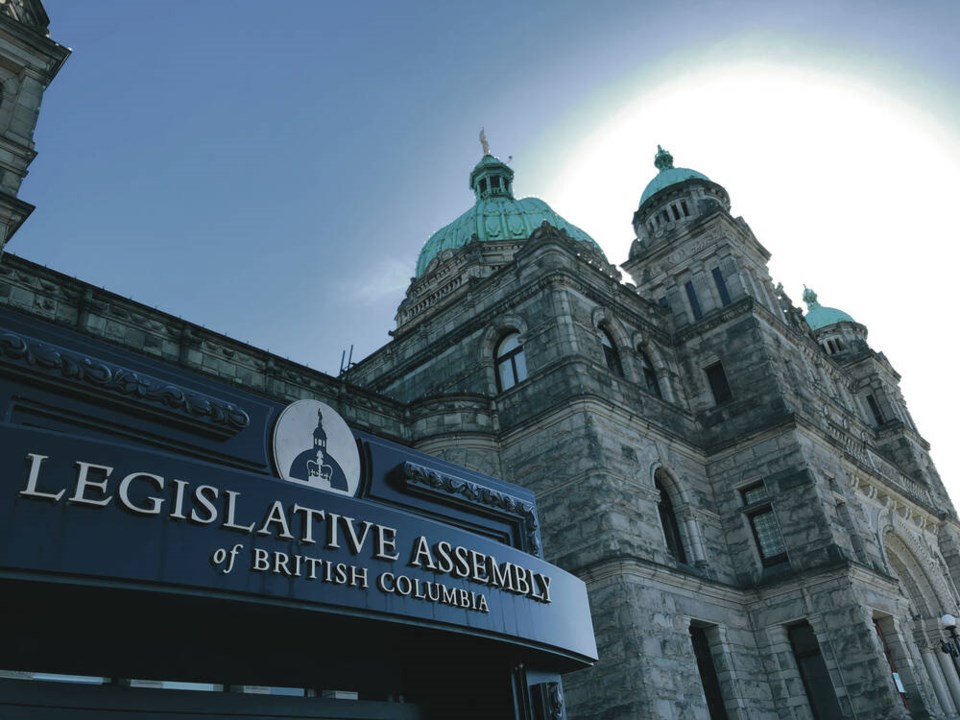The surplus spending spree that Premier David Eby started the day he became premier was just a taste of things to come.
The NDP government’s three-year economic plan unveiled Tuesday commits billions more to people programs with continued emphasis on housing and health. The critical difference is that from here on it will be financed through deficits totalling $11 billion for at least the next three years, not that surprise one-time cash bonanza that materialized last fall.
If you were looking at the economic forecasts the government is seeing, you’d be bracing for a storm, too.
B.C. was resilient through the pandemic, gas price jumps and assorted natural disasters.
But high interest rates and the threat of continued inflation have prompted dramatic downgrades of revenue projections for the coming year. The budget attention will be on new and enhanced services. But they are coming partly because alarm bells are ringing in the background.
Across the board, a six per cent drop in overall revenue is expected this year that will take two further years to make up.
“Steadily declining natural resource revenues” are expected for three years, to the tune of 21 per cent in the coming year.
One example: Forest revenue for the year ending is estimated at $1.9 billion. That’s expected to drop to $846 million in the coming year.
The benchmark timber price is half what it was, and so is the stumpage price. Logging tax revenue is budgeted at one-third what it was in the year closing.
Reductions due to the deferral of large tracts of old-growth from logging are also reflected.
Elsewhere, corporate income tax revenue, one of the main sources of the surprise surplus, was posted at $10.5 billion this year. It’s expected to drop to $6 billion in the coming year.
The official outlook states: “Risks continue to be weighted to the downside.”
Finance Minister Katrine Conroy said “tough times” are ahead, so “you need the government in your corner.”
The pervasive pessimism in the numbers is mostly based on the expectation that B.C.’s economic growth will almost stall out in the coming year, dropping to a half per cent.
That compares to 2.8 per cent this year and six per cent the year previous.
From a political point of view, the plan is to bulk up as much governmental support for the voting population as possible before an election must be called in the fall of 2024 at the latest.
The one thing Eby doesn’t want to be accused of from now until voting day is raising taxes or cutting services to citizens.
The only tax increase in the budget is the carbon tax, and that’s on a federally mandated escalator. It’s not the NDP’s doing. In fact, the province is increasing credits to offset that impact.
With no tax hikes, no service cuts and a looming slowdown, the only solution is to plunge back into deficit financing. So three years of deficits in the $3 billion to $4 billion range are in the works.
The budget also included an update on the status of that $5.7 billion that fuelled Eby’s launch.
Municipalities got $1 billion to spend as they please, B.C. Ferries got a half-billion dollar top-up, $450 million was committed to critical infrastructure and B.C. Cancer Foundation got $150 million.
Those and other smaller announcements used up $2.7 billion of the $5.7 billion. Conroy indicated they’ll be tapping it some more in the month before the end of the fiscal year. What’s left on March 31 must be applied against the debt. But the emphasis is on meeting the appetite for services, not reducing debt.
Total provincial debt will top the $100 billion mark this coming year, and is expected to rise to $134 billion by 2025, but measured against the economy it is not ringing any alarm bells.
Opposition Leader Kevin Falcon said spending growth under the NDP has been meteoric but there are no results to show for it. “Honestly, has anything gotten better?”
“They haven’t prepared themselves at all for a slowing economy.” He said there’s no strategy or purpose. “They’re just doing more of everything. That’s not going to end well.”
>>> To comment on this article, write a letter to the editor: [email protected]




